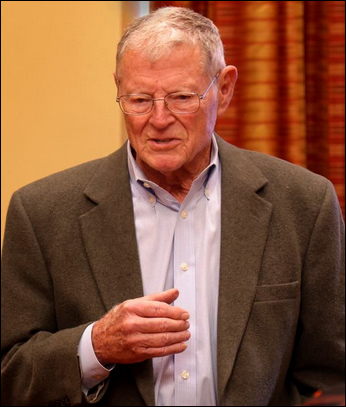By Jim Ellis
Feb. 28, 2022 — Veteran Oklahoma Sen. Jim Inhofe (R), who turned 87 years old last November, is reportedly set to announce that he will leave the Senate at the end of this year. He was first elected in 1994 after serving four terms in the US House and six years as mayor of Tulsa prior to coming to Congress.As of this writing, the senator is expected to sign an irrevocable resignation letter before March 1. If so, he will serve until the end of this year; a special election to replace him will be held concurrently with the 2022 election cycle. His resignation is unexpected, and the reason for his departure has not yet been publicized.
Under the Sooner State special election laws, if a vacancy in the Senate occurs in an even-numbered year, the seat is filled within the regular election schedule. An odd-numbered year vacancy has its own election formula. Oklahoma is one of 13 states that doesn’t fill a Senate vacancy through gubernatorial appointment.
The regular political schedule calls for a primary on June 28, an Aug. 23 runoff if no candidate receives majority support in the first vote, and the general election on Nov. 8. The candidate filing deadline is April 15.
The Inhofe resignation also means that both of the state’s Senate seats will be up for election this autumn since Sen. James Lankford (R) is in-cycle. The special election winner will serve the remaining four years of the Inhofe term and be eligible to run for a full six-year stint in 2026.
While the new Oklahoma Senate race brings the total number of federal statewide campaigns to 35, with Republicans now defending 21, this contest won’t likely alter the aggregate political picture. The GOP should remain safe in both of the Oklahoma general election contests.
The special Republican primary, however, will be a different story. Expect a crowded field and a tough primary campaign and likely runoff, with the eventual winner having an easy ride in the general election.
Already, rumors are flying as to who may run in the special. Names from Gov. Kevin Stitt and Lt. Gov. Mark Pinnell to US Reps. Kevin Hern (R-Tulsa) and Markwayne Mullin (R-Westville) to former state House Speaker T.W. Shannon and ex-US Attorney Trent Shore are already being mentioned.







